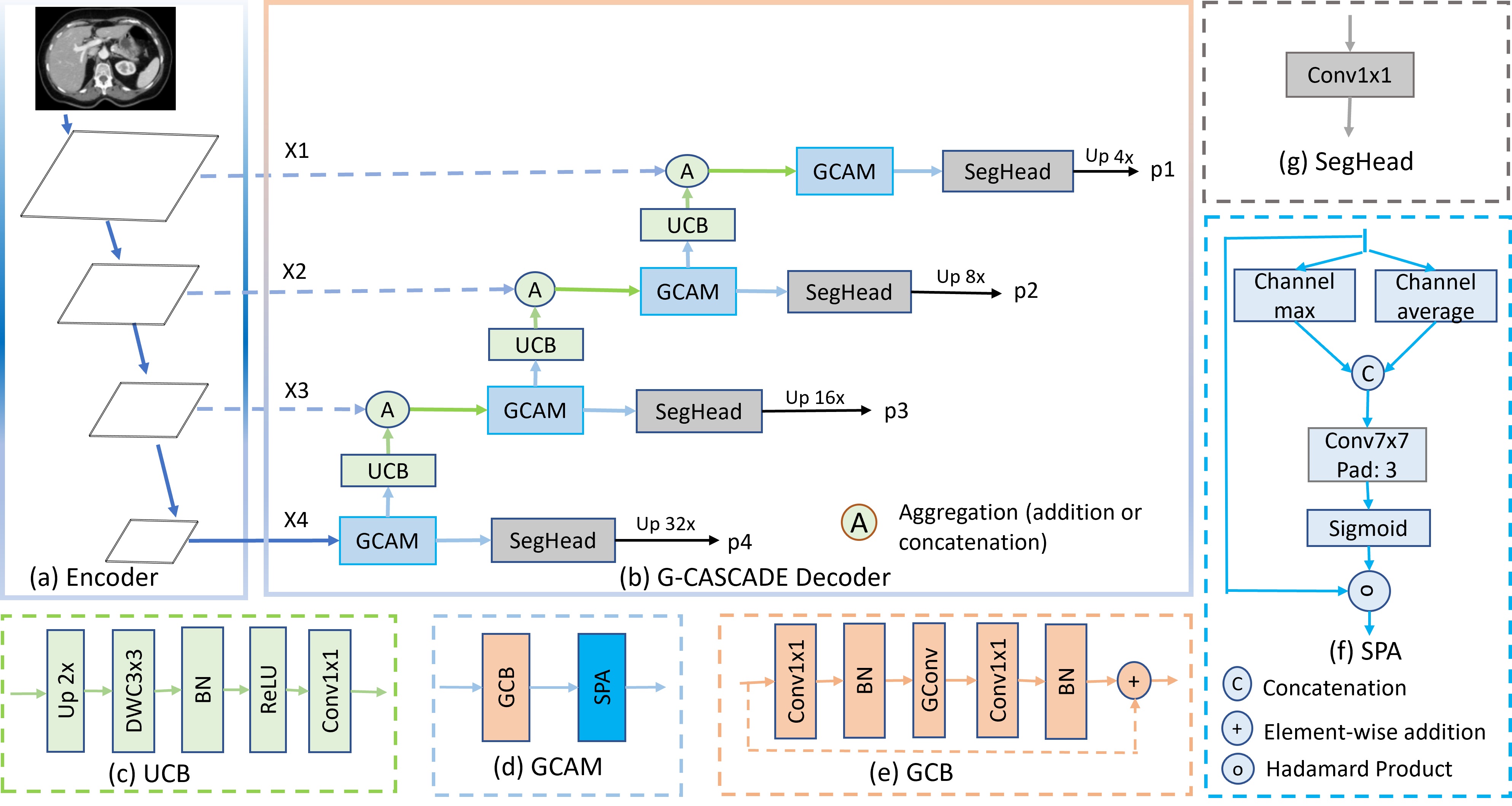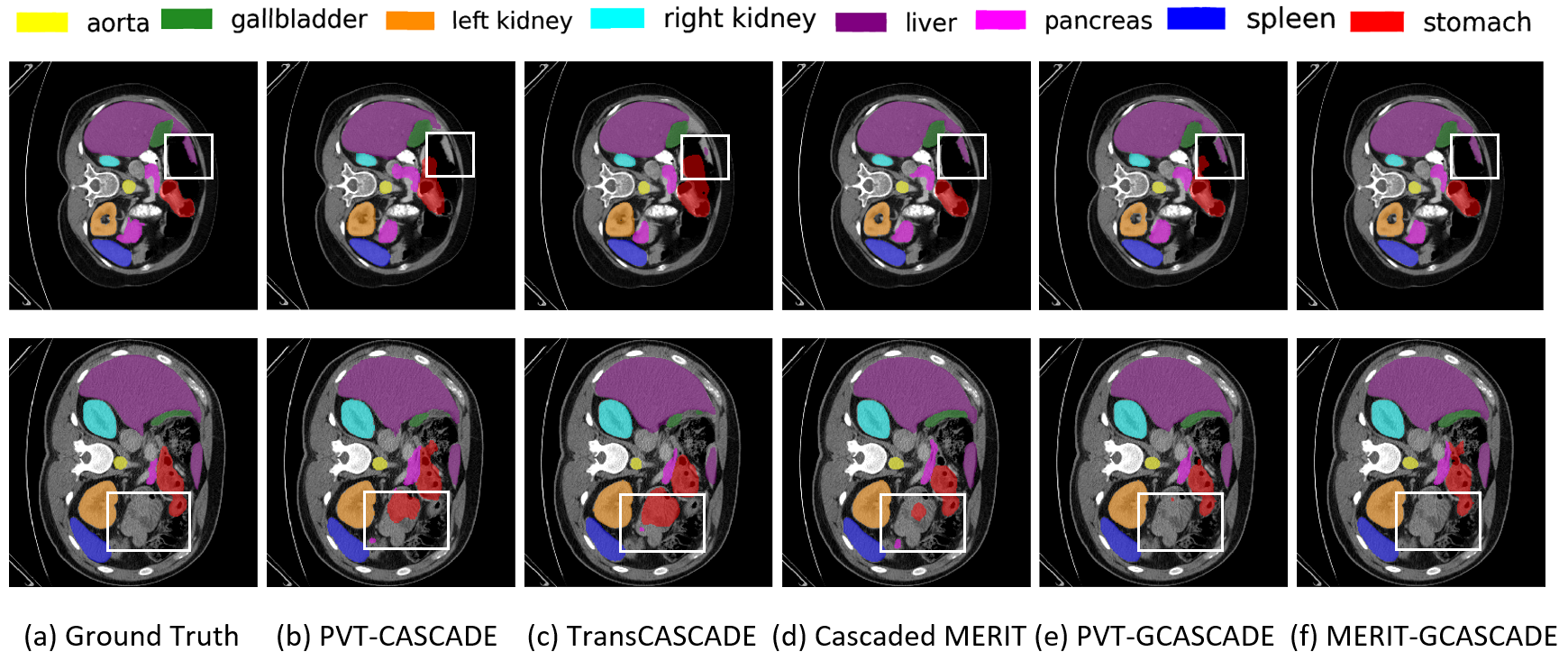Official Pytorch implementation of G-CASCADE: Efficient Cascaded Graph Convolutional Decoding for 2D Medical Image Segmentation WACV 2024. arxiv code
Md Mostafijur Rahman, Radu Marculescu
The University of Texas at Austin
Python 3.8
Pytorch 1.11.0
torchvision 0.12.0
Please use pip install -r requirements.txt to install the dependencies.
-
Synapse Multi-organ dataset: Sign up in the official Synapse website and download the dataset. Then split the 'RawData' folder into 'TrainSet' (18 scans) and 'TestSet' (12 scans) following the TransUNet's lists and put in the './data/synapse/Abdomen/RawData/' folder. Finally, preprocess using
python ./utils/preprocess_synapse_data.pyor download the preprocessed data and save in the './data/synapse/' folder. Note: If you use the preprocessed data from TransUNet, please make necessary changes (i.e., remove the code segment (line# 88-94) to convert groundtruth labels from 14 to 9 classes) in the utils/dataset_synapse.py. -
ACDC dataset: Download the preprocessed ACDC dataset from Google Drive of MT-UNet and move into './data/ACDC/' folder.
-
Polyp datasets: Download the training and testing datasets Google Drive and move them into './data/polyp/' folder.
-
ISIC2018 dataset: Download the training and validation datasets from https://challenge.isic-archive.com/landing/2018/ and merge them together. Afterwards, split the dataset into 80%, 10%, and 10% training, validation, and testing datasets, respectively. Move the splited dataset into './data/ISIC2018/' folder.
You should download the pretrained PVTv2 model from Google Drive, and then put it in the './pretrained_pth/pvt/' folder for initialization. Similarly, you should download the pretrained MaxViT models from Google Drive, and then put it in the './pretrained_pth/maxvit/' folder for initialization.
cd into G-CASCADE
For Synapse Multi-organ dataset training, run CUDA_VISIBLE_DEVICES=0 python -W ignore train_synapse.py
For ACDC dataset training, run CUDA_VISIBLE_DEVICES=0 python -W ignore train_ACDC.py
For Polyp datasets training, run CUDA_VISIBLE_DEVICES=0 python -W ignore train_polyp.py
For ISIC2018 dataset training, run CUDA_VISIBLE_DEVICES=0 python -W ignore train_ISIC2018.py
cd into G-CASCADE
For Synapse Multi-organ dataset testing, run CUDA_VISIBLE_DEVICES=0 python -W ignore test_synapse.py
For ACDC dataset testing, run CUDA_VISIBLE_DEVICES=0 python -W ignore test_ACDC.py
For Polyp dataset testing, run CUDA_VISIBLE_DEVICES=0 python -W ignore test_polyp.py
For ISIC2018 dataset testing, run CUDA_VISIBLE_DEVICES=0 python -W ignore test_ISIC2018.py
We are very grateful for these excellent works timm, MERIT, CASCADE, PraNet, Polyp-PVT and TransUNet, which have provided the basis for our framework.
@inproceedings{rahman2024g,
title={G-CASCADE: Efficient Cascaded Graph Convolutional Decoding for 2D Medical Image Segmentation},
author={Rahman, Md Mostafijur and Marculescu, Radu},
booktitle={Proceedings of the IEEE/CVF Winter Conference on Applications of Computer Vision},
pages={7728--7737},
year={2024}
}

